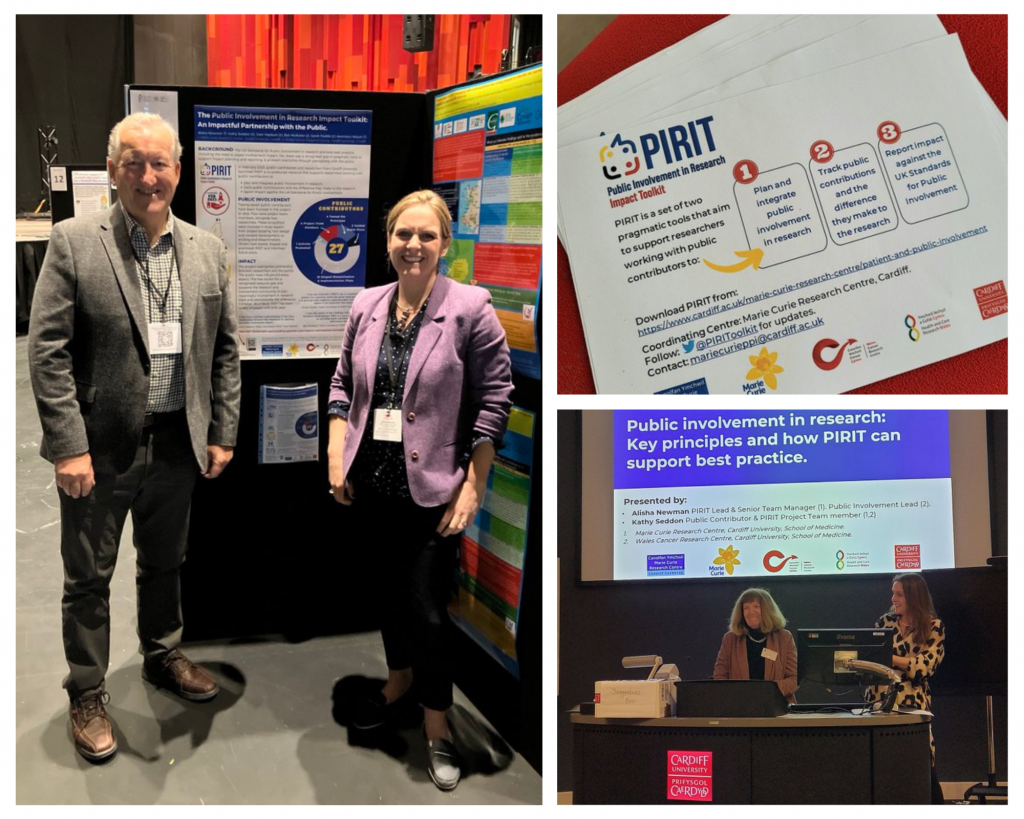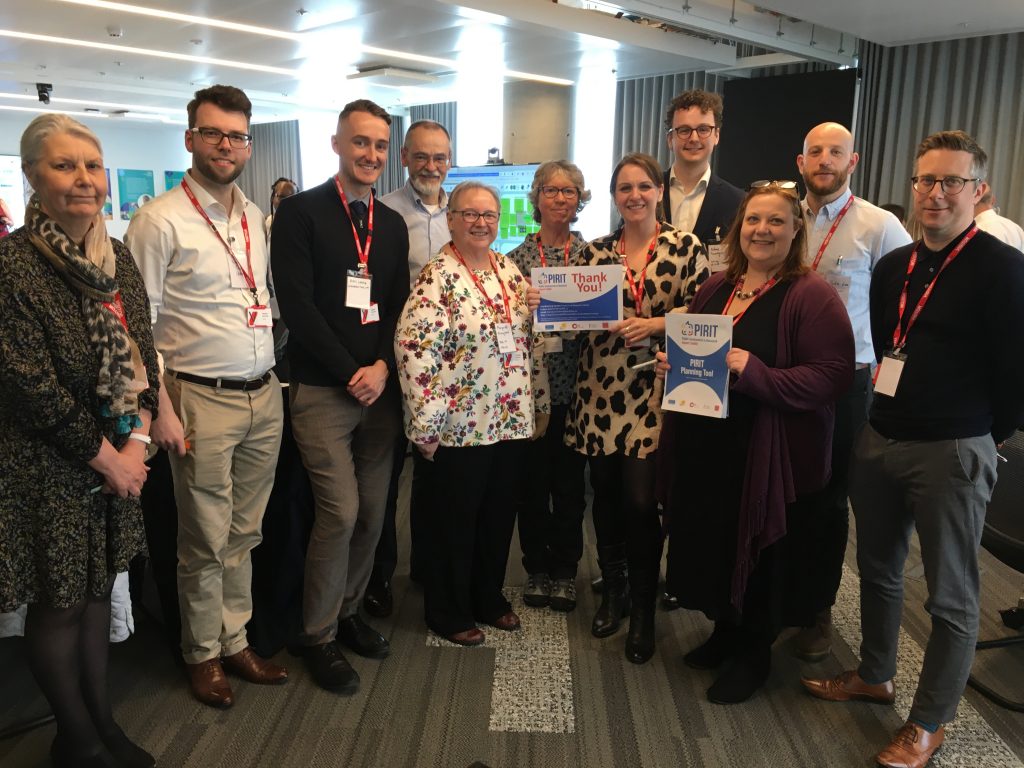
The Public Involvement in Research Impact Toolkit (PIRIT) is marking its one-year anniversary since its launch at the Marie Curie Conference in February 2023.
This free co-produced resource aims to help researchers working with the public to plan meaningful involvement in research alongside helping to track and demonstrate the difference it makes. Over the last year the Toolkit has not only transformed the way researchers address public involvement planning and evaluation through its pragmatic approach, but it has also become an exemplar of collaboration in the research community.
PIRIT Partnerships: A year of collaboration
PIRIT is the result of a collaboration between the Wales Cancer Research Centre (WCRC) and Marie Curie Research Centre (MCRC). Co-produced with members of the public, the project is a shining example of partnership between researchers and the public. A total of twenty-seven public contributors, including four as project team members, have been actively involved in shaping PIRIT. Their involvement ranged from project scoping, tool design, content development and piloting, to dissemination and informing implementation plans.
Throughout 2023, the PIRIT team has focused on extensive engagement efforts, presenting and debating with diverse audiences through conferences, talks, workshops, and training events. These activities not only strengthened existing relationships, but also forged new ones with members of the public and professionals in the public and third sectors.
Global engagement and national endorsement
PIRIT has transcended borders, it has been downloaded over 800 times across 14 countries from Australia to the USA, demonstrating the widespread interest and active engagement of the research and public involvement communities.
Research funders and regulators, including Health and Care Research Wales, the National Institute for Health and Care Research (NIHR), and the Health Research Authority, have actively endorsed and promoted dissemination of the Toolkit, hosting PIRIT webinars and workshops, inclusion in blogs, resource pages and more. Notably, research funders Marie Curie and Health and Care Research Wales have incorporated PIRIT into their grant application guidance.
Peter Gee, Senior Public Involvement Manager at Health and Care Research Wales said:
“The PIRIT toolkit is extremely useful for us at Health and Care Research Wales, it forms part of our guidance for researchers when applying for funding and ensures public involvement runs through everything we do. It’s easy to use for both the members of the public and researchers and we’re looking forward to receiving more feedback on how it has worked in practice, shaping truly life-changing research.”
Jim Elliott, Public Involvement Specialist at the Health Research Authority said:
“PIRIT is a simple and well-laid out set of tools based around the UK Standards for Public Involvement. It can help any organisation or research team plan its involvement of patients and the public in its research-based activities and to record its impact on those activities. It fits perfectly with the aims of the Shared Commitment to Public Involvement in Health and Social Care Research partnership initiative to embed public involvement as usual practice in all health and social care research.”

PIRIT in action
Researchers are increasingly using PIRIT to support research planning and to showcase the tangible impact of public involvement. The Toolkit is benefiting researchers with varying levels of research and public involvement experience and is informing a wide range of practice. Alisha Newman, PIRIT Implementation and Dissemination Lead explains:
“PIRIT is being used by individual PhD students and large research teams alike. Early career researchers have given positive feedback on the Planning Tool as it’s helped them to frame thinking and discussions about public involvement activity. It’s also helped improve the accuracy of their grant costings, as the figures are based more closely on what the public are likely to be involved in and any support they might need. The Tracking Tool’s use is also evolving, as it’s being adapted by several research centres to capture the impact of public involvement on centre level decision-making as well as in individual studies.”
PIRIT is being used in the SERENITY study which focuses on the use of Antithrombotic Therapy in end-of-life care. This €6m Horizon Europe Research and Innovations funded study is involving over fifty researchers and clinicians from 8 countries and 14 institutions across Europe.The SERENITY Patient and Public Involvement team based at Cardiff University is using the Toolkit as part of their patient and public involvement strategy for the study across 6 work packages.
Dr. Michelle Edwards, WCRC Researcher and Public Involvement Lead for the SERENITY study said:
“PIRIT has proven valuable in the SERENITY study so far, providing essential support for planning and evaluating the impact of public involvement activities.”
The Toolkit has also made its mark on the COBra study, a multi-stage project that aims to develop a core outcome set for brain tumour trials. Both PIRIT tools were used during the study by researchers and the involved public to review existing plans and map future activity. Research Associate on the The Brain Tumour Charity funded study, Elin Baddeley said: “Utilising PIRIT helped to spark vital discussions, fostering an expansion of diverse involvement opportunities. This resulted in the recruitment of five additional public members, enriching our study’s development and enhancing survey testing with invaluable insights.”
Reflecting on the PIRIT journey so far, Bob McAlister, a public member of the PIRIT team said: “Having been personally involved in the development of the UK Standards for Public Involvement, I was aware of the challenge and opportunity posed by the Impact Standard. PIRIT is a route map and tool for understanding, forecasting and recording the difference that public contributors will make to the research journey. I encourage others to give it a try.”
A glimpse into the future: next steps for PIRIT
Exciting developments lie ahead for PIRIT, with a paper on its development and evaluation set for publication. The roadmap also includes a dissemination and implementation plan, and seeking funding for a broader evaluation. To meet the rising demand from individuals and organisations for PIRIT demonstrations, a Toolkit tour and FAQs document will be filmed and added to the web page.
Alisha Newman, PIRIT Project Lead, expresses excitement for the future:
“The success and impact of PIRIT in just one year is truly remarkable. We are thrilled to see researchers and public contributors embracing the Toolkit. As we look ahead, PIRIT’s poised to continue driving public involvement planning and evaluation best practice, supporting research communities to foster meaningful partnerships with the public to deliver research that really benefits the public.”
The PIRIT Toolkit is free to download and available for all.
*Image above: PIRIT session attendees featured left to right: Gail Johnson, former Programme manager R&D Division, Health and Social Care Northern Ireland, Simon Turpin, Policy Officer, Association of Medical Research Charities, Dan Wake, Policy Manager, Universities UK, Jim Elliott, Public Involvement Specialist, Health Research Authority, Margaret Grayson, Public Contributor, Health and Social Care Northern Ireland, Maryrose Brennan, Public Contributor, Chief Scientist Office Scotland, Alisha Newman, PIRIT Implementation and Dissemination Lead, Marie Curie Research Centre, Cardiff, Adam Goodyear, Senior Manager: Research Policy, Science Research and Evidence Directorate, Department of Health and Social Care, Alice Williams Head of Patient and Public Involvement (Innovation, Research and Life Sciences), NHS England, Peter Gee, Senior Public Involvement Manager, Health and Care Research Wales, Steve Scott, Public Engagement Manager, UK Research and Innovation